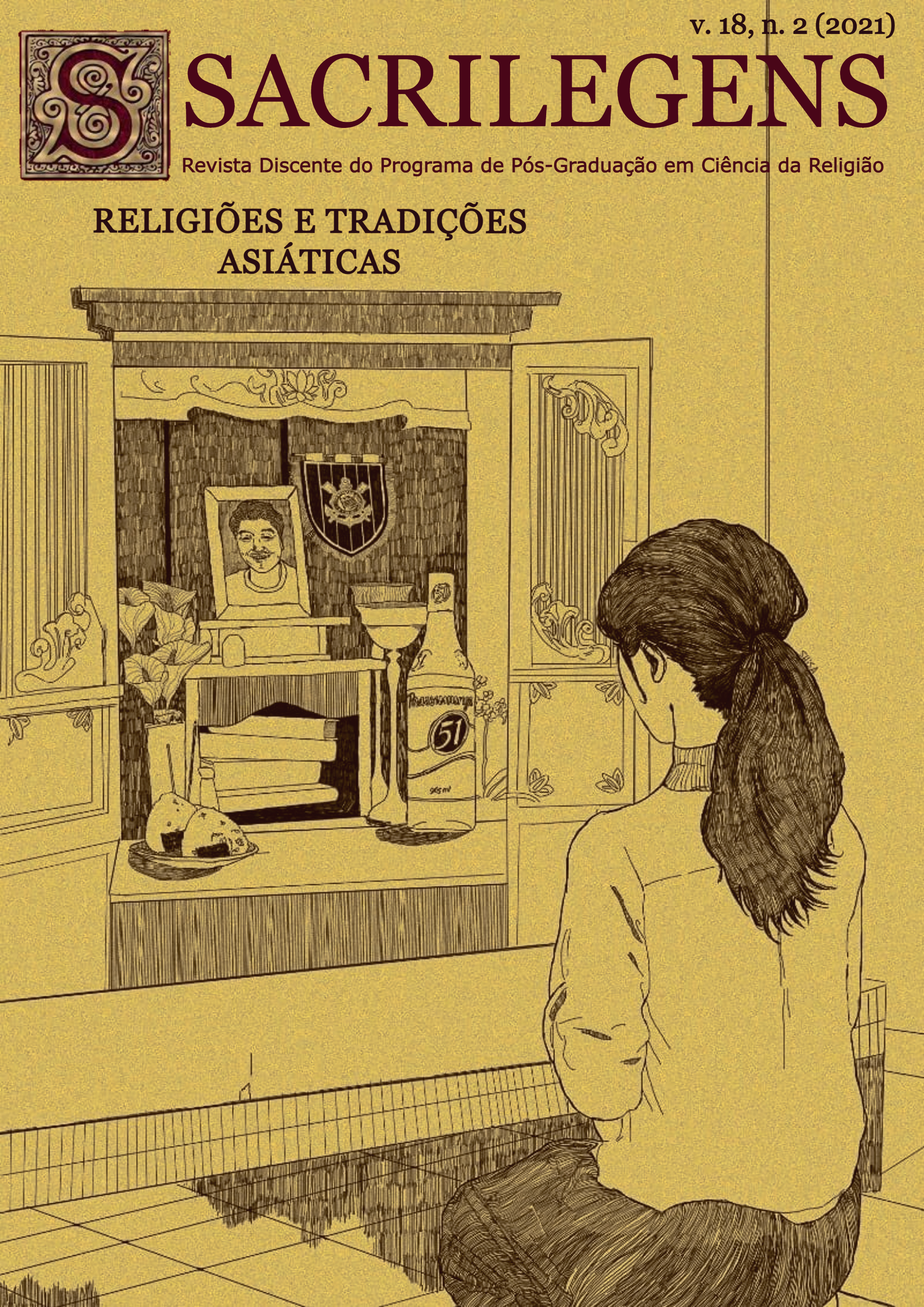Entre o Convencional e o Absoluto: Problemáticas Filosóficas das Escolas Abhidharma de Budismo
DOI:
https://doi.org/10.34019/2237-6151.2021.v18.34609Palavras-chave:
Budismo, Abhidharma, Reificação, Filosofia, LógicaResumo
Este artigo tem como objetivo a discussão da formação histórica do cânone budista, especialmente a porção chamada Abhidharma, bem como as consequências doxológicas daí derivadas. Por meio de uma revisão histórica, pretende-se analisar o desenvolvimento dos principais pontos de contenda entre as escolas do período abhidhármico, as principais abordagens e soluções oferecidas à cisão entre os conceitos de convencional (prajñapti) e absoluto (paramārtha), das primeiras escolas de pensamento do período Abhidharma até a intervenção do filósofo Nāgārjuna.
Downloads
Referências
ANĀLAYO, Bhikkhu. The Dawn of Abhidharma. Hamburg: Hamburg University Press, 2014.
BODHI, Bhikkhu; ÑĀṆAMOLI, Bhikkhu. The middle length discourses of the Buddha: A Translation of the Majjhima Nikāya. 1. ed. Somerville: Wisdom Publications, 1995.
BUSWELL JR, Robert E.; JAINI, Padmanabh S. The development of abhidharma philosophy. In: POTTER, Karl H.; BUSWELL JR, Robert E.; JAINI, Padmanabh S.; REAT, Noble Ross. Encyclopedia of Indian Philosophies Volume VII: Abhidharma Buddhism to 150 A.D. Delhi: Motilal Banarsidass, 1996. v. 7, cap. 3, p. 73-119.
CŪḶAMĀLUNKYA SUTTA. In: Mahāsaṅgīti Tipiṭaka Buddhavasse 2500: Majjhima Nikāya 63: Cūḷamālunkyasutta. Edição por Dhamma Society Fund (Tailândia), 2005. Disponível em: <https://suttacentral.net/mn63/pli/ms>. Acesso em: 18 nov. 2020.
GUNARATNE, R. D. Understanding Nāgārjuna’s catuṣkoṭi. Philosophy East and West, v. 36, n. 3, p. 213-234. 1986.
JAYATILLEKE, Kulatissa Nanda. Early Buddhist theory of knowledge. 6. ed. London & New York: Routledge, 2013.
LAMOTTE, Étienne. History of Indian Buddhism: From the origins to the Śaka Era. Publications de l'Institut Orientaliste de Louvain. Louvain-la-Neuve: Peeters Press, 1988.
LAUMAKIS, Stephen J. An Introduction to Buddhist Philosophy. 1. ed. Cambridge: Cambridge University Press, 2008.
MATILAL, Bimal Krishna. Logic, language and reality: Indian philosophy and contemporary issues. 1. ed. Delhi: Motilal Banarsidass. 1990.
MOHANTY, J. N. Indian Theories of Truth: Thoughts on Their Common Framework. Philosophy East and West, 30(4), 439, 1980.
NĀGĀRJUNA. Versos fundamentais do Caminho do Meio (Mūlamadhyamakakārikā). Tradução por Giuseppe Ferraro. 1. ed. Campinas, SP: Editora PHI, 2016.
PRIEST, Graham. None of the Above: The Catuṣkoṭi in Indian Buddhist Logic. New Directions in Paraconsistent Logic. v. 152. p. 517-527. New Delhi: Springer, 2015.
SAITO, Akira. Is Nāgārjuna a Mādhyamika. Hokeyō to Daijōkyōten no Kenkyū: Studies in the Saddharma-puṇḍarīka-sūtra and Mahāyāna Scriptures, S.L., v. 1, n. 1, p. 153-164, 2007. Disponível em: <https://www.academia.edu/31866531/Is_N%C4%81g%C4%81rjuna_a_M%C4%81dhyamika_In_Hokeky%C5%8D_to_Daij%C5%8Dky%C5%8Dten_no_Kenky%C5%AB_pp._153_164>. Acesso em: 4 nov. 2019.
WALSER, Joseph. Nāgārjuna in Context: Mahāyāna Buddhism & Early Indian Culture. 1. ed. New York: Columbia University Press, 2005.
WESTERHOFF, Jan; Nāgārjuna's Madhyamaka: A philosophical introduction. 1. ed. New York: Oxford University Press, 2009.
______. The Golden Age of Indian Buddhist Philosophy. 1. ed. New York: Oxford University Press. 2018.
WILLEMEN, Charles; DESSEIN, Bart; COX, Collett. Sarvāstivāda Buddhist Scholasticism. 2. ed. Leiden, New York, Köln: Brill, 1998.
WILLIAMS, Paul. Mahāyāna Buddhism: The Doctrinal Foundations. 2. ed. New York: Routledge, 2009.
Downloads
Publicado
Como Citar
Edição
Seção
Licença
Copyright (c) 2022 Pedro da Costa Fernandes

Este trabalho está licenciado sob uma licença Creative Commons Attribution 4.0 International License.
 A Revista Sacrilegens é um periódico de acesso aberto, licenciada sob a licença Creative Commons Attribution 4.0 International
A Revista Sacrilegens é um periódico de acesso aberto, licenciada sob a licença Creative Commons Attribution 4.0 International










